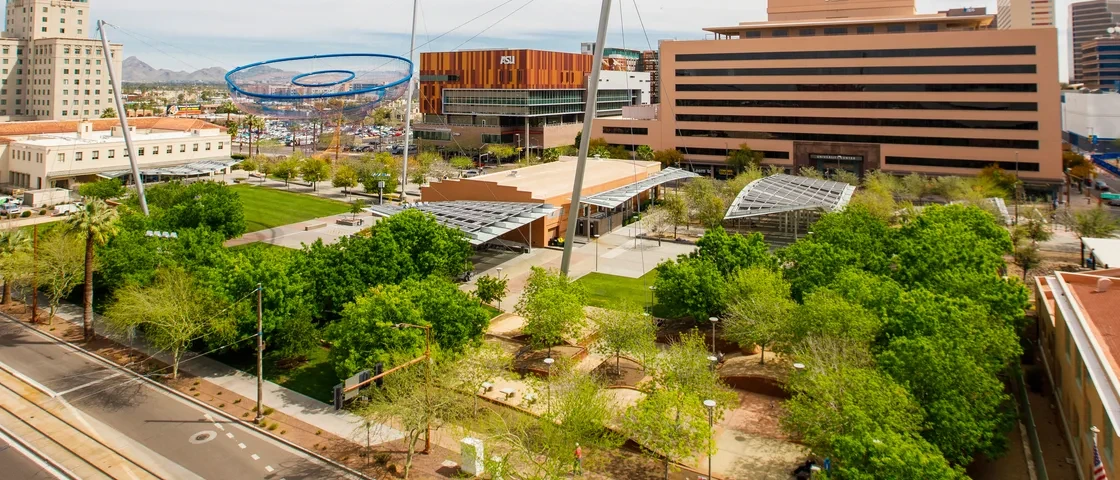

Arizona State University (Downtown Phoenix campus)
Urban and Metropolitan Studies, BS
Study detals
: Bachelor's degree : Urban and Metropolitan Studies, BS PPURBBS : Full time : 48 MonthRequirements
Academic requirements
First-year students must:
- Have a 3.00 grade point average (GPA) (a "B" or better where "A"=4.00) from a secondary school. Some ASU programs may have higher admission or English proficiency requirements and may consider a minimum ACT or SAT score.
- Must have three years of high school coursework. (If you are currently in high school, ASU needs to see 9–11 grade coursework. If you have completed high school, ASU needs to see 10–12 grade coursework.)
- Must have and present a completed high school diploma or certificate.
Conditional admission
ASU may offer conditional undergraduate admission to international applicants to an on-campus program who meet the academic (aptitude) requirements but who are not proficient in English. This offer of conditional admission will give you time to improve your English proficiency before you start classes at ASU. Your conditional admission offer is good for up to three semesters, during which time you must meet one of these requirements to begin your ASU experience.
Competency requirements
International students who completed high school outside the U.S. are required to meet the following competency requirements:
- Math: four years (algebra I, geometry, algebra II and one course requiring algebra II as a prerequisite).
- Laboratory science: three years total (one year each from any of the following areas are accepted: biology, chemistry, earth science, integrated sciences and physics).
Provide evidence of English language proficiency (TOEFL 61)
Additional information
Program description
Located in the heart of downtown Phoenix, the BS program in urban and metropolitan studies is for students who yearn to study and understand urban theory in order to effectively address the challenges of rapid growth along with other contemporary urban issues.
Students in this program discover what makes the city tick --- and the city is their classroom. They examine challenges and solutions by researching history, society, culture, economy and politics in order to understand urban theory, and they use that knowledge to get involved in their communities. This gives them an outlet through which they can experience practical ways of solving complex problems faced by metropolitan regions. The students are invested in their neighborhoods. Many of them live and work downtown, and they learn how to improve urban health and well-being, often training themselves to be the future leaders of urban environments. Others focus on making a wide variety of other contributions to society, studying the role of arts and culture, business and property development, and revitalization and community-building in the life of the region.
This major is eligible for the Western Undergraduate Exchange program at the following location: Downtown Phoenix campus. Students from Western states who select this major and campus may be eligible for reduced nonresident tuition at a rate of 150% of Arizona resident tuition plus all applicable fees.
Concurrent program options
Students pursuing concurrent degrees (also known as a “double major”) earn two distinct degrees and receive two diplomas. Working with their academic advisors, students can create their own concurrent degree combination. Some combinations are not possible due to high levels of overlap in curriculum.
Program learning outcomes identify what a student will learn or be able to do upon completion of their program. This program has the following program outcomes:
- Analyze the basic factors affecting the development of urban policies.
- Use management principles to work effectively in complex urban organizations.
- Apply research and analytic tools to urban public problems.
Global opportunities
Global experience
As populations grow and lead to urban sprawl, countries around the world grapple with how to best serve society. Study abroad programs expose students to challenges large urban and metropolitan cities face in Europe, South America, Africa and Asia. Students experience cultural immersion and research ways to improve and solve complex issues faced by urban and metropolitan cities.
Career opportunities
The transdisciplinary approach of the urban and metropolitan studies program ensures its graduates are prepared for work in a wide range of fields. Graduates successfully enter fields as diverse as urban management, revitalization, community development, urban sustainability and urban planning.
Some careers require additional graduate-level studies and professional experience. Students in the program are advised to explore their options with academic and career advisors to prepare an appropriate program of study and a plan to participate in an internship that complements their long-term professional goals.